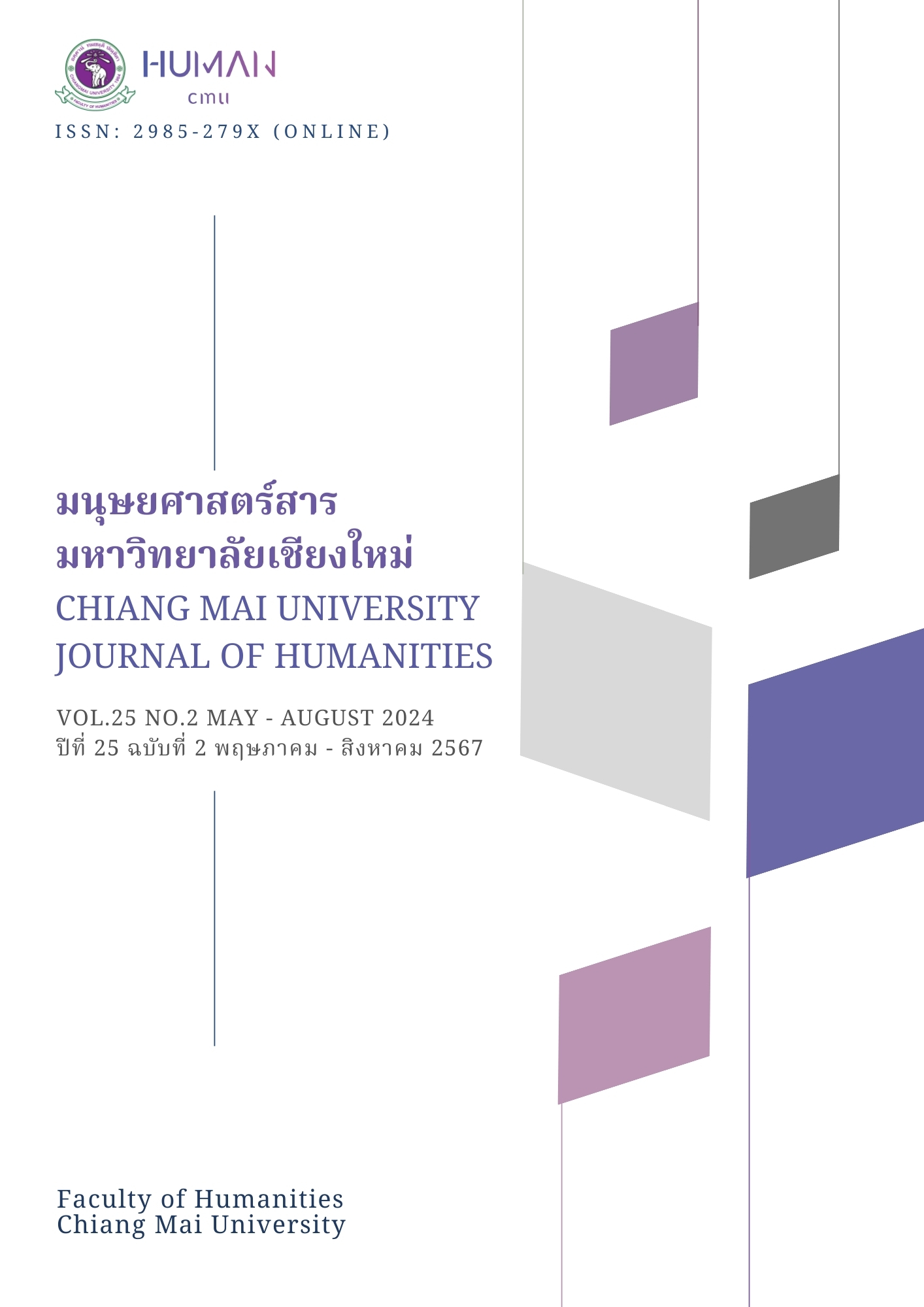ลีลาภาษากับการนำเสนอแนวคิดเกี่ยวกับความเป็นชาติและพลเมืองของชาติในเทศนาเสือป่า
Main Article Content
บทคัดย่อ
งานวิจัยนี้มุ่งศึกษาลีลาภาษากับการนำเสนอแนวคิดเกี่ยวกับความเป็นชาติและพลเมืองของชาติในเทศนาเสือป่า พระราชนิพนธ์ในพระบาทสมเด็จพระมงกุฎเกล้าเจ้าอยู่หัว ผลการศึกษาพบว่าเทศนาเสือป่า มีการใช้ลีลาภาษาในด้านการใช้คำและกลุ่มคำ การใช้ประโยค และการใช้ความเปรียบ ที่นำไปสู่การนำเสนอ ความคิดเกี่ยวกับความเป็นชาติและพลเมืองของชาติ ในด้านการใช้คำและกลุ่มคำ มีการใช้คำที่สื่อสาระสำคัญ ของเรื่อง คำแสดงทัศนภาวะ คำหรือสำนวนเชื่อมความแบบเทศนาธรรม และคำเรียกผู้เกี่ยวข้องในบริบทการสื่อสาร ในด้านการใช้ประโยค มีการใช้ประโยคคำถามเชิงวาทศิลป์ ประโยคแสดงเหตุผล และประโยคซ้ำโครงสร้างเน้นย้ำความ และในด้านการใช้ความเปรียบ มีการใช้ความเปรียบแสดงสภาพหรือคุณลักษณะ และความเปรียบแสดงพฤติกรรมหรือการกระทำ การใช้ลีลาภาษาดังกล่าวการนำมาสู่การนำเสนอความคิดเกี่ยวกับความเป็นชาติและพลเมืองของชาติอย่างมีเอกภาพ ได้แก่ ความเป็นชาติไทยประกอบไปด้วย ชาติ ศาสนา พระมหากษัตริย์ คนไทยต้องรับผิดชอบหน้าที่ของตน เป็นพุทธศาสนิกชนที่ดี และเป็นพลเมืองดีของชาติ และคนไทยต้องประพฤติตนตามหลักศีลธรรมเพื่อประโยชน์แก่ประเทศชาติ
Article Details

อนุญาตภายใต้เงื่อนไข Creative Commons Attribution-NonCommercial-NoDerivatives 4.0 International License.
เอกสารอ้างอิง
กุสุมา รักษมณี. (2533). วิวัฒนาการด้านเนื้อหาและแนวคิดของวรรณคดีไทย. ใน มหาวิทยาลัยสุโขทัยธรรมาธิราช, สาขาวิชาศิลปศาสตร์ (บ.ก.), เอกสารการสอนชุดวิชา พัฒนาการวรรณคดีไทย เล่ม 2 : หน่วยที่ 8-15 (พิมพ์ครั้งที่ 5) (น. 619-661). มหาวิทยาลัยสุโขทัยธรรมาธิราช.
จิรโชค วีระสย, สุรพล ราชภัณฑารักษ์ และ สุรพันธ์ ทับสุวรรณ์. (2551). รัฐศาสตร์ทั่วไป. กรุงเทพฯ: คณะรัฐศาสตร์ มหาวิทยาลัยรามคำแหง.
จุลลา งอนรถ. (2513). กำเนิดและความเป็นมาของลัทธิชาตินิยมในประเทศไทย. [วิทยานิพนธ์ปริญญามหาบัณฑิต, จุฬาลงกรณ์มหาวิทยาลัย]. Chulalongkorn University Intellectual Repository (CUIR). https://cuir.car.chula.ac.th/handle/123456789/47758
ธงชัย วินิจจะกูล. (2556). Siam Mapped: A History of the Geo-Body of a Nation [กำเนิดสยามจากแผนที่: ประวัติศาสตร์ภูมิกายาของชาติ]. อ่าน.
นพัตธร ฤทธิกาญจน์. (2544). พัฒนาการและที่มาของอำนาจอธิปไตยและผู้ใช้อำนาจอธิปไตยในประเทศไทย. [วิทยานิพนธ์ปริญญามหาบัณฑิต, จุฬาลงกรณ์มหาวิทยาลัย]. Chulalongkorn University Intellectual Repository (CUIR). https://cuir.car.chula.ac.th/handle/123456789/23323
ปราณี กุลละวณิชย์, กัลยา ติงศภัทิย์, ม.ร.ว., สุดาพร ลักษณียนาวิน และ อมรา ประสิทธิ์รัฐสินธุ์. (2540). ภาษาทัศนา (พิมพ์ครั้งที่ 4). กรุงเทพฯ: โรงพิมพ์แห่งจุฬาลงกรณ์มหาวิทยาลัย.
พระพรหมคุณาภรณ์ (ป.อ. ปยุตฺโต). (2561). พจนานุกรมพุทธศาสตร์ ฉบับประมวลศัพท์ (พิมพ์ครั้งที่ 32). https://www.watnyanaves.net/th/book_detail/268
ภัชราพร ช้างแก้ว. (2530). พุทธศาสนากับการก่อตัวของรัฐไทยแบบใหม่ในสมัยรัชกาลที่ 5 และรัชกาลที่ 6. [วิทยานิพนธ์ปริญญามหาบัณฑิต, จุฬาลงกรณ์มหาวิทยาลัย]. Chulalongkorn University Intellectual Repository (CUIR). https://cuir.car.chula.ac.th/handle/123456789/29500
มงกุฎเกล้าเจ้าอยู่หัว, พระบาทสมเด็จพระ. (2463). เทศนาเสือป่า/พระบาทสมเด็จพระรามาธิบดีศรีสินทร มหาวชิราวุธ พระมงกุฏเกล้าเจ้าอยู่หัว ทรงแสดง. ม.ป.ท.: ม.ป.พ.
มหาวิทยาลัยรามคำแหง. (2530). สังคมวิทยาและมานุษยวิทยาเบื้องต้น (พิมพ์ครั้งที่ 7).กรุงเทพฯ: มหาวิทยาลัยรามคำแหง.
สุรเดช โชติอุดมพันธ์. (2560). ทฤษฎีวรรณคดีวิจารณ์ตะวันตกในศตวรรษที่ 20 (พิมพ์ครั้งที่ 2). โรงพิมพ์แห่ง จุฬาลงกรณ์มหาวิทยาลัย.
เสกสรร โกศรี. (2557). รัฐไทยกับพลวัตการก่อตัวของเส้นเขตแดนตามแนวคิดรัฐสมัยใหม่หลังเหตุการณ์ ร.ศ.112. [วิทยานิพนธ์ปริญญามหาบัณฑิต, จุฬาลงกรณ์มหาวิทยาลัย]. Chulalongkorn University Intellectual Repository (CUIR). https://cuir.car.chula.ac.th/handle/123456789/44625
อัสนี พูลรักษ์. (2562). สำนวนภาษาในวรรณคดีไทยที่สัมพันธ์กับสำนวนภาษาในวรรณคดีบาลีและสันสกฤต. [วิทยานิพนธ์ปริญญาดุษฎีบัณฑิต, จุฬาลงกรณ์มหาวิทยาลัย]. Chulalongkorn University Intellectual Repository (CUIR). https://cuir.car.chula.ac.th/handle/123456789/69509
ธงชัย หวานแก้ว. (2522). การปลูกฝังความรักชาติตามที่ปรากฏในบทละครพระราชนิพนธ์ของ พระบาทสมเด็จพระมงกุฎเกล้าเจ้าอยู่หัว. [วิทยานิพนธ์ปริญญามหาบัณฑิต, มหาวิทยาลัย
ศรีนครินทรวิโรฒ]. Srinakharinwirot University Institutional Repository (SWU IR). http://thesis.swu.ac.th/swuthesis/Tha/Thongchai_W.pdf
สิริรัตน์ พุ่มเกิด. (2538). “อัศวพาหุ” กับการใช้วรรณกรรมเพื่อเผยแพร่แนวความคิดและอุดมการณ์
ทางการเมือง. [วิทยานิพนธ์ปริญญามหาบัณฑิต, จุฬาลงกรณ์มหาวิทยาลัย]. Chulalongkorn University Intellectual Repository (CUIR). https://cuir.car.chula.ac.th/handle/123456789/62770
อัญชลี ภู่ผะกา. (2553). พระราชนิพนธ์ในพระบาทสมเด็จพระจุลจอมเกล้าเจ้าอยู่หัวและพระบาทสมเด็จพระมงกุฎเกล้าเจ้าอยู่หัว : วรรณคดีกับการสร้างชาติ. (วิทยานิพนธ์ปริญญาดุษฎีบัณฑิต). จุฬาลงกรณ์มหาวิทยาลัย, กรุงเทพฯ.
Leech, G.N. & Short, M.H. (2007). Style in Fiction: A Linguistic Introduction to English Fictional Prose (2nd ed.). Pearson longman.
Saeed, J. I. (2003). Semantics (2nd ed.). Blackwell Publishing.


